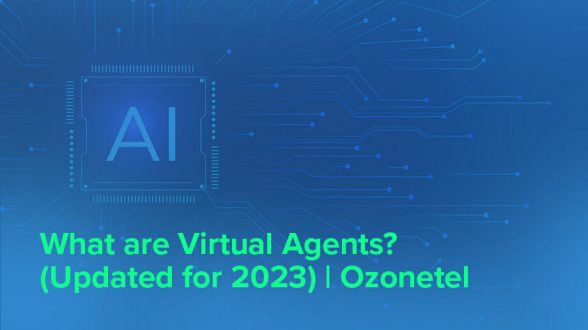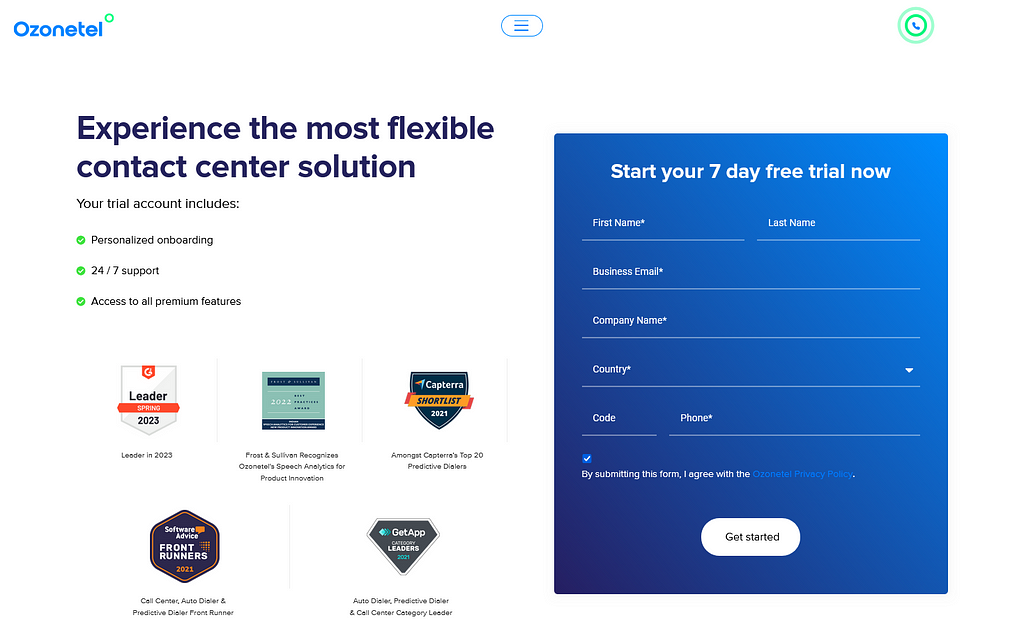- Resources
- What are Virtual Agents? (Updated for 2024)
What are Virtual Agents? (Updated for 2024)

Discovering Virtual Agents: Unlocking the Benefits of Automation for Businesses
Artificial intelligence has become a force of disruptive change in recent years. While businesses across several industries have embraced the power of AI in different forms, it’s becoming increasingly popular for delivering seamless customer support.
Virtual Agents are a prime example of how businesses lean on AI to automate customer service, reduce pressure on their support teams, supercharge sales, and save costs.
But how exactly can you get the best out of Virtual Agents? What factors should you consider when choosing the right Virtual Agent for your business? In this blog, we will dive deeper into the role of Virtual Agents and help you get started with the automation of your customer service workflows.
What is a Virtual Agent?
A Virtual Agent is an AI-powered chatbot capable of understanding customer requests, identifying the right intent, and providing accurate information. It can act as a full-fledged contact center programmed to answer customer questions and offer round-the-clock support without any manual intervention.
A Virtual Agent is equipped with multiple capabilities, such as:
1. Handling different types of customer interactions, like tickets, chats, calls, and more.
2. Understand user intent and direct them to the right resources for finding the information they need.
3. Performing multiple tasks, like order management, data collection, optimizing experience, and similar.
Think of Virtual Agents as an extension of your customer support teams. They can reduce some workload for your staff and function independently to resolve L1 queries for customers.
How Do Virtual Agents Work?
A Virtual Agent is programmed with the rules of conversational AI to fulfill a specific purpose, primarily customer service. You can create scripted responses for the agent to answer any questions or requests accurately.
When customers submit their requests to a Virtual Agent—like a question or request, it uses natural language processing to understand the inquiry. Once it has decoded the query through keywords, it analyzes all the scripted responses to choose the most meaningful answer for the inquiry.
Conversational AI equips a Virtual Agent with advanced capabilities to carry out an entire conversation while keeping the context in mind.
These AI-based Virtual Agents can be deployed on a business website, app, social media, WhatsApp or messaging channel, or even on their phone channel or IVR. The same AI can be used to assist both customers and agents.
How to Use a Virtual Agent?
Virtual Agents have many use cases. When used strategically, Virtual Agents can be a game changer for organizations in every space, be it retail, SaaS, travel, or any other industry. Let’s look at five main ways in which VAs can benefit your company.
Virtual Agent vs. Virtual Assistant
While people use the terms virtual agent and virtual assistant interchangeably, the two terms differ starkly. Both are automated software designed to perform specific tasks through the power of AI.
However, a virtual assistant operates in a broader scope.
VAs like Siri and Alexa search the entire internet to find relevant answers to any requests. They’re programmed to look up information on any topic and perform tasks like calling, playing music, finding songs, and more.
On the flip side, a virtual agent is mostly company-specific. It performs a predefined set of tasks, mostly related to answering questions. Organizations use this tool to answer customer questions or assist employees.
Virtual Agents Vs Chatbots
Chatbots and virtual agents are both designed to enable bot-to-human conversations. The common goal is to automate simple tasks, resolve repetitive queries & free-up agents for more productive work. While chatbots only recognize words or phrases they have been specifically programmed to understand, Virtual Agents are basically clever bots powered by conversational AI. They have the ability to learn and self-improve.
Companies can use this software for:
- Collect quick feedback on chat or call with pre-recorded options.
- Solve customer queries and create tickets for more complex requests.
- Automate IVR experience to connect customers to support executives.
- Track user activity on a website/landing page and optimize their experience.
- Promote specific offers for potential customers based on their browsing activity.
5 Core Benefits of Using a Virtual Agent for your Brand
Here are the five ways in which you can level up your customer service or sales using Virtual Agents:
1. 24×7 Assistance
One of the obvious benefits of using a Virtual Agent is the continuity in your customer service efforts. Instead of hiring support staff for multiple shifts throughout the day, save costs by training a Virtual Agent to handle a bulk of queries beyond your business hours.
2. Quick Resolution
Nobody likes waiting on a call to hear from a support executive—not even for a few seconds. Cut down your wait time and avoid this friction in the customer experience with a faster time to resolution, thanks to a well-trained Virtual Agent.
3. Unmatched Scalability
Whether you’re servicing 10 clients or 10,000, a Virtual Agent will never be stretched too thin. So, you can scale your business conveniently without thinking twice about your servicing efforts.
4. Reduced Workloads
A huge advantage of using a Virtual Agent is the time it frees up for your team. They don’t have to waste more effort answering the same old questions. Instead, they can focus on more meaningful processes and handle high-value tickets that truly require human empathy and expertise.
5. Better Sales
Besides helping your existing customers, a Virtual Agent can also engage potential customers and nudge them toward a buying decision. Your VA can analyze website/app visitors’ browsing activity and give them contextual support to simplify their buying decision, driving up your conversion rates.
Simply put, a Virtual Agent can become a huge differentiator for your business by giving customers a more seamless and hassle-free experience.
How to Choose the Right Virtual Agent for Your Business?
Now that you know how Virtual Agents can change the game for you, let’s look at a few factors to consider when choosing the ideal Virtual Agent for your business:
1. Customization Capabilities
If you want to deliver on-brand support that’s instantly recognizable, you must customize your Virtual Agent to match your brand’s look and feel. So, check the level of customization you can achieve and pick the one that meets your expectations. You should be able to customize the typeface, color palette, and overall theme of your Virtual Agent to create a consistent brand experience.
2. Multichannel Options
You can place a Virtual Agent anywhere—a website, landing page, mobile app, messaging platforms, and the options are endless. Look for tools that offer multi-channel agents to integrate your VA with different channels. A multichannel Virtual Agent, connected to your CRM tool, can offer continuity to users by carrying out the same conversation on several platforms.
3. Contextual Delivery
One way to gain an edge with automated customer support is to never let your customers feel that they are talking to an automated tool. This is where a Virtual Agent’s contextual abilities come into play. Check out every tool’s use cases and technological makeup to understand what they are capable of.
4. Analytics
By answering so many customer queries, your Virtual Agent can become a repository of critical customer knowledge for your business. It can guide improvements for your knowledge base, enhancements in scripted responses, and user engagement. So, evaluate every tool’s analytics function to finalize the best option. Tools with a robust reporting function will give you a granular view of how customers are engaging with your brand.
5. Multilingual Support
If you are a global brand or have plans to expand internationally, you want to pick a Virtual Agent equipped to support multiple languages. This is an essential consideration for your scalability plans. Meet customers where they are by offering support in their local language.
6. Budget
Most VA tools offer tiered pricing based on your product usage. You can choose the perfect tool after evaluating your exact requirements and setting your overall budget for customer service.
7. Human Failover
Virtual Agents have their limitations. For the best results, your Virtual Agent should know when and which queries to hand over to a human representative. To make this handover seamless, your Virtual Agents should also be able to give the agent complete context of the conversation. This could be as simple as giving agents access to the chat transcript, though, in an ideal scenario, your Virtual Agent should also be agent-facing. What this means is that your Virtual Agent can assist your agent with smart cues in a manner just like smart replies within Gmail.
Overall, your Virtual Agent needs to be deeply embedded into your contact center with deep integrations to your CRM and other knowledge databases to offer customers a seamless journey.
In a Nutshell
It is time you level up your CX offering with AI-powered call centers and Virtual Agents. Aligned tactically with human support, Virtual Agents can accelerate the speed of resolution, reduce friction, optimize performance & vastly improve customer experience. For a growing business, you do not need to automate the entire process in one go with a big investment. Start with one or a few processes that matter most, analyze ROI, and then add more processes accordingly.
Ready to take control of your call transfer
experience for better CX outcomes?
Frequently Asked Questions
Ozonetel offers a conversational AI solution capable of transforming your customer experience. Our AI-powered assistant is designed to offer just-in-time support to customers worldwide. With an intuitive interface and one-click integration, you can provide a memorable experience without creating too much hassle for your team.
Here’s what sets Ozonetel apart from other virtual agent solutions:
1. Available for multiple channels like live chat, WhatsApp, and social media channels.
2. Real-time processing to understand all responses quicker and offer proactive answers.
3. Use of natural language processing to accurately understand queries and recognize the intent.
4. Offer unified support across the customer journey using deep integrations with your CRM and ticketing software.
5. Designed for multiple use cases to integrate with auto-dialers, answer queries, offer contextual support, and more.
6. Trained to learn continuously to avoid errors, improve with every conversation, and self-train to address complex requests.
Virtual agents can be used for a diverse assortment of tasks. It can be used for customer support, knowledge-based tasks, sales, payments among others.
Virtual Agents deliver enhanced experiences for customers as well as employees across multiple sectors. It can be used to automate tasks in education, healthcare, human resources, IT firms and real-estate sectors among others.
Prashanth Kancherla
Chief Operating Officer, Ozonetel Communications
Over the past decade, Prashanth has worked with 3000+ customer experience and contact center leaders...
Chief Operating Officer, Ozonetel Communications
Over the past decade, Prashanth has worked with 3000+ customer experience and contact center leaders to comprehensively understand the need for effective and efficient customer communications at every step of their journey with a brand. Deeply embedded in today’s CCaaS ecosystem, he has been instrumental in Ozonetel's growth and contributed in various roles including product management, sales, and solution architecture.







